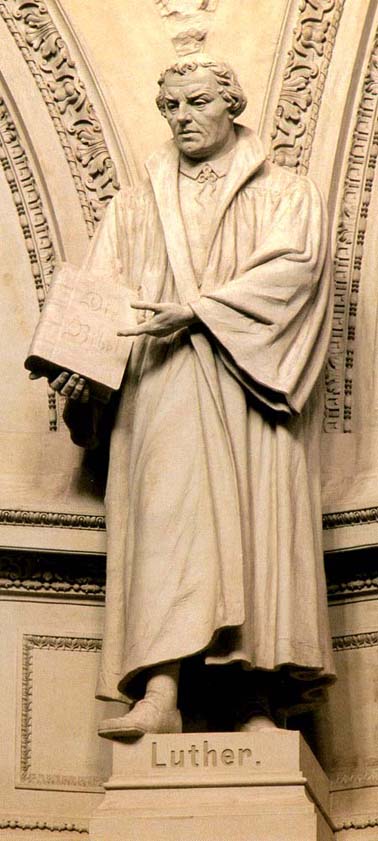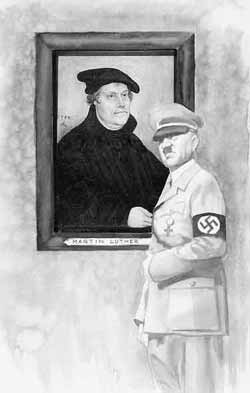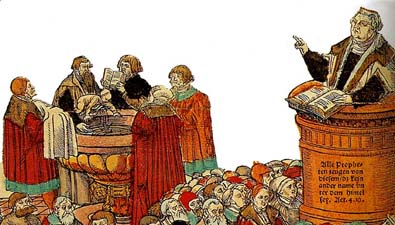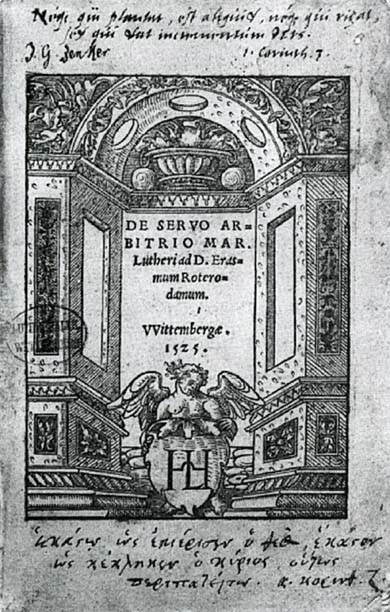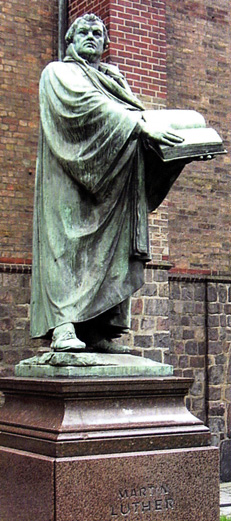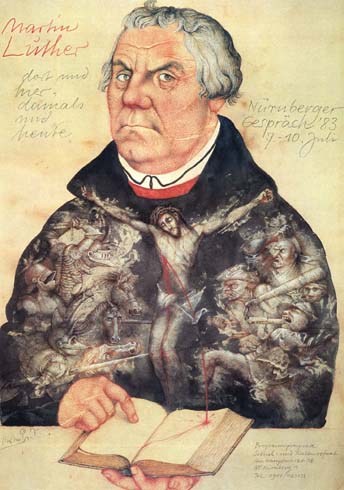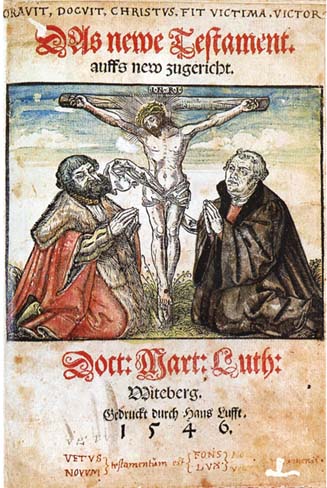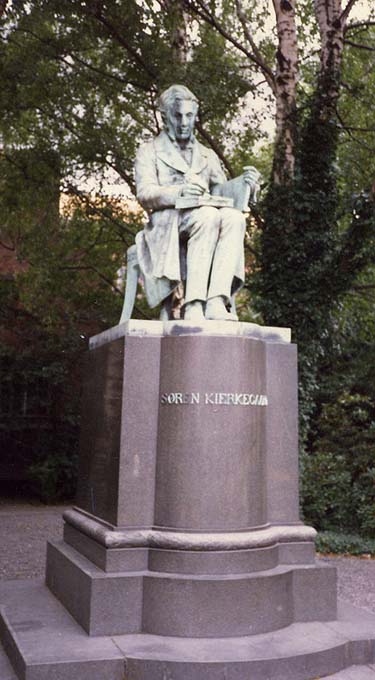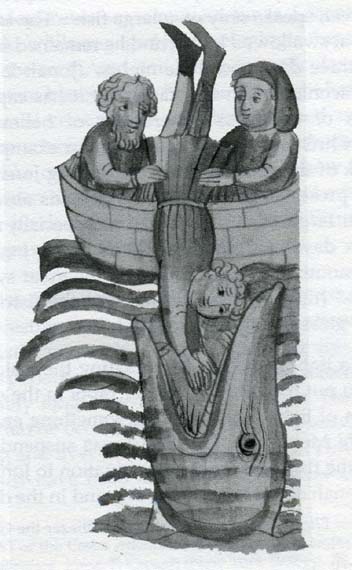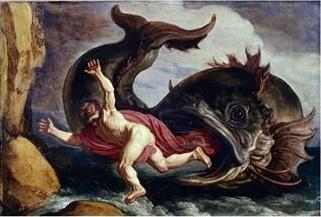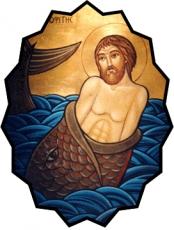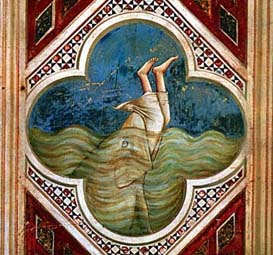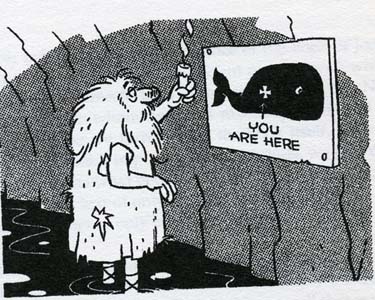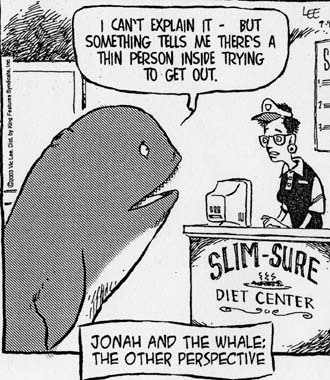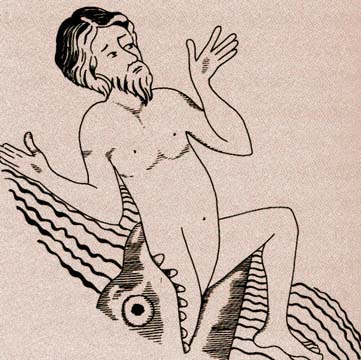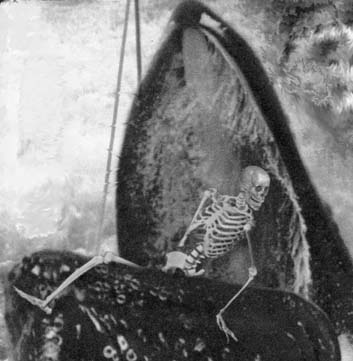|
|
Martin Luther Our Most Eminent Teacher Pastor
Marshall December
2007 But
since the early 1800s, Lutherans have been fudging on this. They
haven’t changed the stated position itself – they still declare
Luther is the best – it’s just that they now willfully, defiantly
and shamefully ignore what he wrote, while letting the words stand that
say he’s the best teacher we have. So modern Lutherans say they’re
Lutherans but they bark up other trees and drink from other wells. To
see this at work, one has only to check out the April 2007 issue of Lutheran
Women Today (volume 20), which explores how best to understand God,
and see that Luther is never mentioned, while Michelangelo and James Weldon Johnson are! This is
but one example taken from a massive trend of denial and neglect. Bible.
Two
more examples of how Lutherans are doing this regards how we read the
Bible and what we think about Judaism. When the New Testament quotes the
Old Testament, for instance, it doesn't explain the context of the Old
Testament words – who is saying what, to whom, and for what reason.
Nor is the historical background sorted out or the literary nature of
the words sized up – as modern
critical Biblical analysis does. Rather it just quotes the earlier holy words with
absolutely no commentary. So when Jesus quotes Zechariah 12:10 in John
19:37, he gives no citation but simply says, “And again another
scripture says, ‘They shall look on him whom they have pierced.’”
And when James 2:23 quotes Genesis 15:6 it only says, “The scripture
was fulfilled which says, ‘Abraham believed God, and it was reckoned
to him as righteousness.’” [For other examples, see Luke 20:42; Acts
2:25, 34, 7:48-49, 13:35; Romans 9:15, 17, 25, 10:11, 16, 19, 21, 11:2,
9, 12:19, 14:11, 15:12; 1 Timothy 5:18; Hebrews 5:6; James 4:5-6.] So
Luther argued for the plain sense of a Bible verse. He didn’t write
commentaries in order to make “the Bible say the opposite of what it
seems to say” (Donald H. Juel, “Homosexuality and Church
Tradition,” Word & Word,
Spring 1990). Rather, Luther argued, we should “just hear” the Bible
verse, and give up trying to “interpret” it (Luther’s
Works 23:229; 39:165). So he worked long and hard, for instance, to
show that when Jesus said of the sacramental bread in Matthew 26:26,
“This is my body,” that little word “is’ in this simple sentence
actually means “is” and not something fancier and obscure like
“represents” (LW 37:30-35). Jews.
And many American Lutherans have also rejected Luther because of his alleged
anti-Semitism or hatred of the Jews – even formally condemning him
twice for this at national conventions in 1974 (ALC) and 1994 (ELCA).
So even the
prestigious Luther scholar, George Wolfgang Forell, concludes that in
Luther's critique of the Jews, "the great theologian of the cross
revealed his triumphalist Achilles’ heel” [The
Luther Legacy (1983) p. 63]. And other scholars agree. James M.
Kittelson says this treatise is a "poison" in the church [Luther
the Reformer (1986, 2003) p. 275]. Heiko A. Oberman says Luther
"becomes a pawn of modern anti-Semitism" in this 1543 treatise [Luther
(1989) p. 297]. And Martin Marty says that Luther is at his worst when
writing this treatise and that it contributes to his overall judgment
that Luther is an "extreme" thinker
– and unjustifiably so [Martin
Luther (2004) pp. 174, 194]. Not all, however, who reject this 1543
treatise also reject what Luther says elsewhere, but a growing number
are doing so. For instance, more and more are supposing that if Luther
was too harsh on the Jews, then when he condemns homosexual behavior (LW
3:255), he's also being too harsh on gays and lesbians as well [see
Homosexuality, Science, and the "Plain Sense" of Scripture (2000)
ed. David L. Balch, pp. 190-191].
So words like these
from students of Luther make it look like he is guilty as charged. And
it surely doesn't help that a vicious anti-Semite in Hitler's government
was named Martin Franz Julius Luther (1895-1945) [see Christopher R.
Browning, The Origins of the Final
Solution: The Evolution of Nazi Jewish Policy, September 1939 – March
1942 (2004) pp. 342-43].
But I think these
judgments against Luther are unjustifiable. This is because, in large
part, Luther's four-part, 170 page book on the Jews is rarely read
through carefully by those who condemn it and understood even less well
by those who skim over it once or twice, searching for juicy invectives
– since they have already made up their minds against Luther on other
grounds – whether they be sacramental, Biblical, catechetical,
psychological or ecclesiastical – and are only in search of some
non-controvertible evidence to clinch their case against him. They know
nothing about – and care even less – that the great Luther scholar, E.
Gordon Rupp in his book Martin
Luther: Hitler's Cause or Cure? (1945) decisively refuted Peter F.
Wiener's book, Martin Luther:
Hitler's Spiritual Ancestor (1945, 1999), which accused Luther of
anti-Semitism largely because of this 1543 treatise on the Jews.
Consequently their judgment against Luther for his treatise on the Jews
is skewed and anything but compelling.
So if the truth
would be known, Luther "was not involved with later racial
anti-Semitism. [For] there is a world of difference between his belief
in salvation and a racial ideology" [Martin Brecht,
Martin Luther, 3 volumes
(1985-1993) 3:351]. Therefore Luther can say that "we Goyim... confess
that Mary [the Mother of our Lord Jesus] is not ours but rather the
Jews' cousin and blood relative [whom] we praise and laud... highly" (LW
47:260). Now no anti-Semite could ever say this – without retching. But
Luther says it, not only clearly and deliberately, but also with joy,
passion and pride – something which, if not noted and appreciated, only
distorts Luther.
So being part of his
view of salvation, Luther's critique of the Jews – which is actually
only a critique of Judaism – is not due to any personal hatred for the
Jews, but is only a matter of following what the Bible has to say –
especially the New Testament (but see also
LW 47:178-192 on Genesis
49:10) – believing that "it is incumbent on all to know God's book" (LW
47:280). So in this treatise on the Jews Luther is arguing against the
religion of Judaism and not against the Jews in any anti-Semitic way at
all, because that is what the Bible does. And it's a terrible mistake to
suppose that his anti-Judaism implies anti-Semitism – since it
clearly doesn't – even though for others it might. Luther, however, “did
not believe the world would be a better place without Jews but he
believed passionately that Christendom would be better without Judaism,
just as it would be better without papalism and without Anabaptism”
[Derek Wilson, Out of the Storm:
The Life and Legacy of Martin Luther (2007) p. 316].
So when Luther is attacked for his views on the Jews, more often than
not, the real target is the Bible – and not Luther's supposed hatred at
all. So most critics of this 1543 treatise don't actually have a beef
with Luther's fabricated anti-Semitism at all – regardless of what they
say. What they're really upset about is Luther's harsh view of Christian
salvation – which Luther says is deeply embedded in the Bible itself.
But this is harder to own up to, since attacking a deeply Biblical view
of salvation can boomerang on the critics, making then look religiously
irresponsible.
Now regarding salvation, we're told two things in the Bible about the
Jews. First, that they, like all people, are welcome to believe in and
follow Christ, because “God shows no partiality” (Acts 10:34). So the
Jews are not excluded simply because of their ethnic background. If they
were to be excluded on those ground, that would be anti-Semitic. That
being said, however, the Bible also teaches that when a Jew – or anyone
else, for that matter, follows Judaism – the view that God blesses those
who keep his Law – that person becomes “unworthy of eternal life” (Acts
13:46). This is because Judaism, as a religion, cannot deliver what it
promises – for it has become “obsolete” due to the appearing of Jesus
Christ, the Messiah and very Son of God (Hebrews 7:19, 8:13; 2
Corinthians 3:10; 1 Peter 1:18; Romans 3:20, 8:3).
This negative
judgment is not anti-Semitic but only against the saving power of
Judaism, which is rooted in following the law. So as the Jewish convert
to Christianity, Roy H. Schoeman, has written, it is a “pernicious
error” to suppose “that the Old and New Covenants are two ‘separate but
equal’ parallel paths to salvation, the one intended for Jews, the other
for Gentiles” [Salvation is From
the Jews (2003) p. 353]. The truth rather is that salvation only
comes through the name of Jesus Christ (Acts 4:12). It is this
anti-Judaism which is at the heart of Luther's 1543 treatise on the Jews
– which has nothing to do with anti-Semitism.
But this anti-Judaism doesn’t imply that Christianity hasn’t benefited
from Judaism. To the contrary, Christians have received from Judaism the
Law, the critique of idol worship, covenants with Noah, Abraham and
David and the stirring witness of the patriarchs and prophets, to say
nothing of the Savior himself (Romans 9:4-5) (LW
47:302)! So Christians have rightly taken these treasures and built upon
them. But none of these gifts assures sinners of God’s love for them and
the hope of eternal life once they've died and gone to meet their maker
(1 Corinthians 15:26-56). Salvation from God's wrath only comes through
“faith in Jesus Christ” (Romans 3:22, 5:9; John 3:16, 36).
This is the truth
given us, which we must honor, even though, as Lutherans know and
confess, it is “repulsive... to the judgment of reason,” and that a
religion based on the law, like Judaism, is “more plausible” [The
Book of Concord (1580) ed. T. Tappert (1959) p. 139]. But that
offense doesn’t make Christianity any less true. No, not at all. In
fact, this offensiveness may even contribute to its truth (Matthew
11:6). So when our feathers get ruffled by Luther's treatise, that's not
reason enough to give up on it. That's because Lutherans know how
repulsive Christianity essentially and necessarily is. Many, therefore,
who insists on throwing out Luther's treatise any way, are also those
who have first done the same with a harsh view of Christianity in favor
of a milder one.
So when Luther says
that the Jews should be punished for their rejection of Christianity and
their attempts to draw Christians into Judaism (LW
47:290), he's only laying out what the Bible says. Luke 16:16 says, for
instance, that “every one enters the kingdom of God violently.” St. Paul
was knocked flat on the road to Damascus, right before he "put on
Christ" (Acts 9:4; Galatians 3:27). And everyone since then has been
required to die to themselves too – being knocked flat spiritually, if
you will – in order to believe in Jesus (2 Corinthians 5:13-17). And the
Jews are no exception to this rough pedagogy. They also will have to
suffer "many tribulations" before they enter the kingdom of God (Acts
14:22). This is what Luther calls
Christianissima saeveritas or "Christian severity" (LW 26:118). Those therefore who reject Luther's 1543 treatise on the
Jews have a prior negative reaction to his general religious severity.
Unfortunately this is rarely if ever admitted in their critiques of his
1543 treatise on the Jews. Instead, Luther the messenger, is slain for bringing a
message from God – which is not that uncommon but still always
wrong to do.
So even in the Old Testament, we must note – quite apart from Luther's
treatise – that God tries to scare the Jews straight. Again and again he
punishes them mercilessly – especially through invading military powers
under the leadership of Cyrus (Isaiah 44:28) and Nebuchadrezzar
(Jeremiah 39:3). And in Hosea, God specifically says – and quite
abhorrently – of the disobedient Jews, that their children should be
killed, their families should become infertile, and that they should be
driven from their homes and made to wander among the nations (Hosea
9:7-17). It's important to note here, how much this prophecy sounds like
what years later showed up in Hitler’s playbook. This helps one see the
horrible truth about the ghastly nature of the Bible. So attacking
Luther's alleged anti-Semitism in the name of some fabricated and
exclusively loving Bible, is to get tangled up in theological chicanery.
The message of the Bible is tough and one has to settle for that or
throw it out. All sophisticated, urbane efforts to clean up the Bible
fail by the death of a thousand qualifications.
And it must also be
noted that these tough Old Testament words inspired Luther (who quotes
Hosea eight times in his treatise) when he advises destroying Jewish
synagogues, homes, religious books, preventing rabbis from teaching,
ending gainful employment and safe-conduct for Jews, and imposing hard
labor on them (LW 47:268-272). So indeed his polemic against Judaism is
not derived from a personal hatred for them, but is rather "drawn from
the Old Testament... prophets" [Gerhard O. Forde, "Luther and the Jews,"
(ALC, 1977) p. 18]. In the raging debate, then, over whether or not it's
right to spank our children, Luther would come down squarely on the side
of spanking (see John Rosemond, To Spank or Not to Spank: A Parent's Handbook, 1994). For he deeply
believed in Proverbs 13:24 that sparing the rod spoils the child. This,
in effect, then, is what he is doing in his 1543 treatise on the Jews –
giving them a good licking (LW
47:197) – as offensive as that may seem to those with liberal ears.
But if Luther
rightly opposed killing the Jews for their disobedience (contra the Old Testament prescription), why did he still advise
other terrible punishments against them? Why didn't he ignore those
Biblical punishments as any enlightened, urbane Christian would? Many
suppose he didn't ignore them because he hated the Jews and was a
terrible, evil person [see Richard Marius,
Martin
Luther
(1999) p. 377]. But what Luther says is very different than that. He
says, instead, that he advised punishments first to witness to the Holy
Scriptures – for Jesus himself rebuked the Jews (LW
47:277) – and secondly, to scare the Jews straight so that they might
receive God's blessings (LW 47:267).
Luther believed that
the Jews were a stubborn, stiff-necked people, as the Bible says (Exodus
32:9; Ezekiel 3:7-9; Acts 7:51-53) (LW
47:252). Therefore he knew that harsh corrections were needed if they
were to be helped – "harsh" or "sharp" mercy was required, rather than
"gentle" mercy (LW 47:268,
272, 276, 292) – for that's what it takes to "soften" up recalcitrant
sinners (LW 47:206) –
something Christians also need to know regarding themselves (LW 47:161, 253). His driving concern, then, was not vengeance or
anything like that, but only the “welfare” of the Jewish people (LW
47:178, 267, 274). He had no interest in killing them off as Hitler did
– for Luther knew that vengeance belonged to God alone (LW
47:189). Luther, then, to the contrary, only wanted to end God’s
long-standing wrath against the Jews (LW
47:241, 263, 273, 292), and he knew that would only come about through
faith in the Messiah (LW 47:215, 295). "Innumerable people, both young
and old" within Judaism had accepted Christianity with sincerity down
through the centuries, and Luther wanted many more Jews to do the same (LW
47:283, 306).
That being the case,
it would be unloving and unwise to repudiate Luther’s 1543 treatise on
the Jews. He knew that many Jews believed in Jesus Christ, the Messiah (LW
47:237, 299, 304) – and he wanted many more to follow suit. He didn't
want to ignore Ezekiel 3:16-21 and withhold God's warning from them –
thereby "aiding and abetting" their faithlessness (LW 47:274, 275, 279, 284). He wanted instead to restore the
Messianic "heritage" to Israel which the Jews had "ruined" by rejecting
and vilifying Jesus (LW
47:254). In order to do this he was willing for people to be
"displeased" with him (LW
47:185), for he knew he had written an unpleasant, but necessary book on
the Jews (LW 47:291).
In this way Luther's
treatise is eminently – and surprisingly – pastoral. "Underlying the
divine chastisement is God's 'painful grace,' the purpose of which is to
strangle the old Adam so that the believer might turn to God alone for
every good" [Dennis Ngien, Luther
as a Spiritual Adviser (2007) p. 155]. So condemning this treatise
only undercuts these noble Christian goals – something no faithful,
self-respecting Christian should ever want to do, or dare to do. The
fact that many have done so anyway points to their lack of understanding
and compassion for the Jews. This is because they are not willing to
bear ignominy and vilification for trying to scare the Jews straight as
Luther was willing to do. They instead are content to rest in the comfortable,
unbiblical view that the Jews are safe for eternity without any belief
in Jesus as their savior. But such comfort I cannot countenance because
"it belongs to the very essence of a faith founded on justification by
grace, that there is no distinction, and that I am called to preach
Christ crucified, not by Jews, but [crucified] by us all, and thus to proclaim him
to all" (Forde, "Luther and the Jews," p. 19). |
|
|
Luther’s
Catechis Cutting Up Our Sinful Hearts The
same could be said for Luther’s famous Ninety-Five
Theses (1517), which began the reformation of the church in Now in the Small Catechism Luther also uses the sword of God’s Word (Hebrews
4:12) to cut us up mercilessly. But these lacerations are either skipped
or passed over lightly by most readers. This is deplorable, of course.
Few care, however. Nevertheless,
Luther begins his little gem by saying that if you won’t learn it you
should be refused “food and drink,” and banished from your home [The
Book of Concord (1580) ed. T. Tappert (1959) p. 339]. Then in the
first section he tells us that fearing God doesn’t mean casual respect
for a dignitary. Rather it means being afraid that God will “punish”
us if we transgress his commandments (p. 344). In the next section he
tells us of our religious impotence – that we cannot by “our own
reason or strength” believe in Jesus Christ. So if we believe, it’s
because God has “enlightened” us and “preserved” us in the faith. When
we therefore believe in Jesus it’s not because we have chosen to or
selected him from among various live options (p. 345). For in matters of
religion we must never suppose we’re free to make up our own minds –
regardless of what evangelists say when they tell us
to make Jesus our personal lord and savior. This can’t be since our
faith doesn’t depend on the “exertion” of our will (Romans 9:16). In the third section Luther says we “deserve nothing but
punishment” (p. 347). So we can’t go around saying God is always
looking for new ways to bless us. That’s just not the case – the
opposite rather is. He’s out to crush us – like a bug on the
sidewalk. Just remember all those mothers with their little crying
babies that he mercilessly drowned in the flood (Genesis 7:21; Isaiah
13:9; Matthew 3:12; Romans 2:5-11). At the end of this section he says
this life is nothing but a “world of sorrow” (p. 348) – so much
for those much vaunted lakefront summer vacations. All they really are is distractions. In the section on baptism he says there’s nothing cute about
it. Rather it is about drowning or putting to death our sins and evil
lusts “by daily sorrow and repentance” (p. 349). So thinking that
when we rejoice in Christ (
In the section on the Lord’s Supper he says it’s all about
the “forgiveness of sins” (p. 352). So it’s not a meal where we
select our favorite beverage or type of cup. Neither is it a
light-hearted community celebration. That only turns this testament
about the forgiveness of sins into a silly little carnival. In the
section on prayer we’re told to make the sign of the cross on
ourselves and know that “the wicked one” is trying to run us over on
a daily basis (p. 352). And in the last section we’re told that “all
the household well will fare” if and only if every member in the
family learns their lessons and does their chores daily. Otherwise chaos
will ensue – and with that a model dysfunctional family. Luther continues these swipes in his Large Catechism (1529) – which is some five times longer. There we read: “Like pigs and dogs [we] remember no more of the Gospel than [a] rotten,... shameful, carnal liberty” (p. 359); “The most common idol on earth is.... money and possessions” (p. 365); “We grossly... desecrate the holy [Sabbath when we] listen to God’s Word as [we] would to any other entertainment” (p. 378); “Let everyone... remember that God is not to be taken lightly.... If you obey him you are his dear child; [if not, take] shame, misery and grief for your reward” (p. 385); “God calls all persons murderers who do not offer... aid to men in need” (p. 391); “[Christianity] is not a nice, soft life” (p. 392); “Christ... restored [me] to the Father’s... grace.... [by suffering and dying] that he might make satisfaction... and pay what I owed, not with silver and gold but with his own precious blood” (p. 414); “Let no... Christian... think... he will have peace... on earth” (p. 429); “God’s Word cannot err” (p. 444); “A Christian life is... a daily Baptism,.... incessantly... purging out whatever pertains to the old Adam” (p. 445); ‘The Lord’s Supper is given as a daily food... so that our faith may... grow continually stronger. For the new life should be one that continually... progresses” (p. 449); and “If you proudly stay away from confession, then... you are no Christian” (p. 460). The Messenger, October 2005.) |
|
|
Martin
Luther’s The Bondage of
the Will (1525) [De
servo (~liberum) arbitrio (~voluntas); which
might more accurately be translated, On Unfree
Choice] Preface [A]
One of My Best Books.
“Regarding the plan to collect my writings in volumes, I am quite cool
and not at all eager about it because, roused by a Saturnian hunger, I
would rather see them all devoured. For I acknowledge none of them to be
really a book of mine, except perhaps the one On
the Bound Will and Catechism”
(Luther’s Works 50:172-173, Letter of July 9, 1537). [B]
Not My Will Be Done. “A
good will is found only where there is no will. Where there is no will,
God’s will, which is the very best, will be present…. [But] you may
say, ‘Well, did God not endow us with a free will?’ I reply: To be
sure, he gave you a free will. But why do you want to make it your own
will? Why not let it remain free? If you do with it whatever you will,
it is not a free will, but your own will. God did not give you or anyone
one else a will of your own. Your own will comes from the devil and from
Adam, who transformed the free will received from God into his own. A
free will does not want its own way, but looks only to God’s will for
direction. By so doing it then also remains free, untrammeled and
unshackled…. Our will is the most formidable element in us, and
against it we must pray, ‘O Father, do not let me get to the point
where my will is done. Break my will; resist it. No matter what happens
let my life be governed not by my will, but by yours. As no one’s own
will prevails in heaven so may it also be here on earth.’ Such a
petition or its fulfillment is indeed very painful to our human nature,
for our own will is the greatest and most deeply rooted evil in us, and
nothing is dearer to us than our own will” (LW
42:48 – 1519). [C]
Free Will = Self Will. “I
would wish that the words, ‘free will,’ had never been invented.
They are not found in Scripture and would better be called ‘self
will’ which is of no use. But if anyone wishes to retain these words,
he ought to apply them to the newly created man…. But those who are
involved in sins are not free, but prisoners of the devil…. This error
about ‘free will’ is a special doctrine of Antichrist. Small wonder
that it has spread all over the world, for it is written of this
Antichrist that he will seduce the whole world. Only few Christians will
be saved” (LW 32:94 –
1521). [D]
I Cannot Believe. “I believe that by my own
reason or strength I cannot believe in Jesus Christ, my Lord, or come to
him. But the Holy Spirit has called me through the Gospel, enlightened
me with his gifts, and sanctified and preserved me in true faith” [Small Catechism (1529) 2:6, The
Book of Concord (1580), ed. T. Tappert (1959) p. 345]. [E]
Knowing You’re Saved.
“I will… send My Son…. in order that you may be able to know
whether you are predestined or not…. If you listen to Him, are
baptized in His name, and love His Word, then you are surely predestined
and are certain of your salvation. But if you revile or despise the
Word, then you are damned; for he who does not believe is condemned
(Mark 16:16)” (LW 5:45 –
1542). [F]
Bound But Still Responsible.
“You must use the things given and granted to you by God in His
kindness. You must rule, work, and strive not to tempt God. You must not
throw yourself headlong into danger… because you have the promise that
God does not want to forsake you…. For God fulfills His promises with
definite means. One should not join those fanatics – who conclude that
everything is foreknown – and say: ‘If I have been predestined, I
shall be saved; if not, I shall perish. If it is necessary to die, care
for the body and life will profit nothing. If I am destined to be
learned, I shall become learned even without books, etc.’ But God has
not given His promises with this arrangement…. He does not want to
fulfill the end of His promises without means; He wants to do so through
means. He has given us the use of the creatures, and these must be used
by Christians until we come to the end of the divine promises” (LW
5:256-257). Introduction
[G]
Writing On the Run. “While
writing The Bondage of the Will,
Luther was occupied with the problems of the peasants’ revolt, with Müntzer’s
revolutionary, spiritual Christianity, and with the newly initiated
controversy over the Lord’s Supper, to say nothing of his personal
career, amid all these complications considerably altered by his
marriage and the founding of his own large household in June 1525. The De
servo arbitrio was composed mainly in the autumn of 1525. By the end
of December 1525, it was in print” [Bernhard Lohse, Martin Luther’s Theology, ed. and trans. Roy A. Harrisville
(Fortress, 1999) pp. 162-163]. [H]
His Quickly Written, 8 Day Book.
“I am sending you, my Michael [Stifel], my rebuttal of Erasmus, which
I completed as best I could in a short time and in a hurry…. [It seems
that Luther finished the manuscript between November 11 and 18; see WA
18, 581. The printing began while Luther was still working on the
manuscript]” (LW 49:140, Letter, 12-31-1525 and note 3). [I]
Like [J]
Reviving Double Predestination.
“In The Bondage of the Will
Luther must be set against a debate already a thousand years old in the [K]
Going Against Modern Ideas.
“The Bondage of the Will is
Luther’s polemical tract against Erasmus – and ‘modern’ men of
all eras” [Heiko A. Oberman, Luther:
Man Between God and the Devil (Yale, 1989) p. 211]. [L]
Yet Moderns Intrigued
Nevertheless. “De servo
arbitrio remained in comparative obscurity for a
quarter-millennium…. In marked contrast to its relative neglect in the
period after Luther’s death stands a modern fascination with the work.
In the nineteenth century followers and foes alike rediscovered De
servo arbitrio, and it became the source of both severe criticism of
the reformer’s theology and new insights into the nature of his
thought” [Robert Kolb, Bound Choice, Election, and [M]
Free Will Not Christian. “On
the Bondage of the Will hurt Erasmus deeply. He replied twice. For
Luther, his own single contribution to the debate was enough. He fully
intended the implication that Erasmus was not a Christian. It was not
just that Erasmus was in error, but also that he was putting himself
forth as a teacher of the faithful. In such a situation no holds were
barred” [James M. Kittelson, Luther
the Reformer (1986, 2003) p. 206]. [N]
Condemning De Servo. “Gordon Rupp praised The Bondage of the Will extravagantly. It is not a judgment I share.
The work is insulting, monstrously unfair, and utterly
uncompromising…. Of all his Catholic foes, only Erasmus sought to
approach Luther gently. Luther responded with a blast that echoes with
cannonades and associated horrors of the coming religious wars – wars
fought over doctrines with no hope of rational solution, elaborate
formulations dissolved finally in the religious skepticism that gave us
the Enlightenment and either depersonalized God or chased him out of the
infinite heavens in the interest of peace and goodwill among
humankind” [Richard Marius,
Martin Luther: The Christian Between God and Death (Harvard, 1999)
p. 456]. [O]
His Greatest Book. “The
Bondage of the Will is the greatest piece of theological writing
that ever came from Luther’s pen…. In its fertility of thought, its
vigour of language, its profound theological grasp, its sustained
strength of argument and the grand sweep of its exposition, it stands
unsurpassed among Luther’s writings. It is the worthiest
representative of his mature thought that he has left us, and is a far
finer memorial of his theological prowess than are the smaller tracts of
the preceding years, which are so much better known” [Martin
Luther on The Bondage of the Will, trans. J. I. Packer & O. R.
Johnson (Revell, 1957) pp. 40-41]. [P]
Lutherans Against Luther.
“Ignoring Luther’s exposition of God’s foreknowledge as creative,
the concordists instead repeated the distinction of Prosper of Aquitaine
[390-463], which Spangenberg [1528-1604] and Chytraeus [1531-1600],
among others, had used, between God’s foreknowledge of all things and
his predestination of his chosen children to salvation (SD XI:4-27).
This distinction does not solve the theodical problem. It only asserts
that God is not responsible for the evil he foresees. It thus also
evades the issue of God’s lordship over all that leads to questions
about the origin of evil. Where Luther specifically admitted that the
human mind could not grasp the ways of God, the Formula [1577] sidesteps
the question. It seems content to get God off the hook. It returns to
the position of Augsburg Confession article XIX: only the human creature
and Satan are responsible for evil. It is precisely at this point…
that the Formula diverges most from De
servo arbitrio” (Kolb, Bound
Choice, p. 268). [Q]
Not American. “Schmucker
[1799-1873] was opposed to any form of a doctrine of election. He stated
adamantly [that] ‘the theory of absolute predestination is generally
regarded, by the laity at least, with horror’” [David A. Gustafson, Lutherans
in Crisis: The Question of Identity in the American Republic ( [R]
What the Church Needs.
“Writing a book on Luther’s Bondage
of the Will is a foolhardy business – not because the arguments
are so hard to understand but rather because they are difficult for
sinners to take…. The result has been as Luther predicted. The people,
and now even the professors, know practically nothing of this doctrine
– knowledge of which Luther considered absolutely essential to
salvation! Small wonder that the [S]
A Better Title: The Grandeur of
the Creator. “An appropriate alternative for the title [to
Luther’s book on the bound will, that] might better capture [its
intent, would be] ‘the Grandeur of the Creator’” (Kolb, Bound
Choice, p. 20). [T]
A Raucous Hymn. “[The Bondage of the Will is] a raucous hymn to the freedom of God”
[Martin Marty, Martin Luther
(Penguin, 2004) p. 133]. [U]
Within God’s Own Triune Rapture of Freedom. “God is freedom antecedent
to himself as determinate free will. He can intelligibly be said to be
this as the Father is the source of the Son and both are freed in the
Spirit [2 Corinthians 3:17]…. [This] hangs beautifully together said
of the triune God and as part of one conceptual structure with
propositions asserting his triunity, and if said of any other sort of
God makes a mere collection of disparate debating points – and it may
well be the personal unitarianism of most modern historical scholars
which has so often led them to see de
servo arbitrio as just such a farrago [or hodgepodge]…. Human
freedom, in the only sense Luther wants to talk about, is nothing less
than participation in God’s own triune rapture of freedom,…. that
God frees us ‘by the Spirit,’ by that personhood in which he is his
own freedom” [Robert W. Jensen, “An Ontology of Freedom in De
Servo Arbitrio of Luther,” Modern
Theology 10 (July 1994 247-252, pp. 250, 252]. Selections
from De servo arbitrio [1]
Only God Opens Our Hearts. “Free choice is a pure fiction; for,
like the woman in the Gospel (Mark 5:25), the more it is treated by the
doctors, the worse it gets…. Therefore, we must pray to God that he
may open my mouth and your heart, and the hearts of all men, and that he
may himself be present in our midst as the master who informs both our
speaking and hearing” (Luther’s
Works 33:18-19). [2]
Sinners Make the Bible Unclear. “It is true that for many people
much remains abstruse; but this is not due to the obscurity of
Scripture, but to the blindness or indolence of those who will not take
the trouble to look at the very clearest truth…. Let miserable men,
therefore, stop imputing with blasphemous perversity the darkness and
obscurity of their own hearts to the wholly clear Scriptures of God” (LW
33:27). [3]
Ice-Cold Christianity. “Christianity as you [Erasmus] describe it
includes this among other things: that we should strive with all our
might, have recourse to the remedy of penitence, and entreat by all
means the mercy of the Lord, without which no human will or endeavor is
effective; also that no one should despair of the pardon of a God who is
by nature most merciful. These words of yours, devoid of Christ, devoid
of the Spirit, are colder than ice itself” (LW
33:30-31). [4]
Wishy-Washy Teaching. “That prudence of yours makes you veer
about, determined not to commit yourself to either side, but to pass
safely between Scylla and Charybdis; with the result that, finding
yourself battered and buffeted by the waves in the midst of the sea, you
assert everything you deny and deny everything you assert” (LW
33:33). [5]
Best Laid Plans of Mice and Men.
“Why are these things abstruse to us Christians, so that its is
irreverent and… vain to discuss… them when heathen poets and even
the common people speak of them quite freely?.... [For] fact and
experience prove… that no man’s plans have ever been
straightforwardly realized, but for everyone things have turned out
differently from what he thought they would be” (LW 33:41). [6]
Actually Consoling. “This
is the one supreme consolation of Christians in all adversities, to know
that God does not lie, but does all things immutably, and that his will
can neither be resisted nor changed nor hindered” (LW
33:43). [7]
Losing God is the Worst. “Diseases,… seditions, sects,… wars,
and anything else of this sort…. are temporal [and] less evil to
endure than the inveterate wickedness through which souls will… be
lost if they are not changed by the Word of God; and if that Word were
taken away, then eternal good, God, Christ, the Spirit, would go with
it. But surely it is preferable to lose the world rather than God the
creator of the world,… who is better than infinite worlds!” (LW
33:53). [8]
God’s More Than We Can Grasp. “The operations of God are not
childish or bourgeois or human, but divine and exceeding human grasp”
(LW 33:54). [9]
Don’t Try to Save More Than a Few. “The Word of God and
traditions of men are irreconcilably opposed to one another, precisely
as God himself and Satan are mutually opposed, each destroying the
work… of the other…. [Those who] abuse [God’s] freedom…. should
not be considered so important that in order to prevent [this] the Word
of God must be taken away. If not all cannot be saved, yet some are
saved, and it is for their sake that the Word of God comes” (LW
33:54-55). [10]
Criticizing God is Foolish. “You are of the opinion that the truth
and usefulness of Scripture is to be measured and judged by the
reactions of men, and the most ungodly men at that…. To talk as you
do, one must imagine the Living God to be nothing but a kind of shallow
and ignorant ranter declaiming from some platform, whose words you can
if you wish interpret in any direction you like” (LW
33:59-60). [11]
Wait on God in Despair & Humility. “No man can be thoroughly
humbled until he knows that his salvation is utterly beyond his powers,
devices, endeavors, will, and works, and depends entirely on the choice,
will, and work of another, namely, of God alone. For as long as he is
persuaded that he himself can do even the least thing toward his
salvation, he retains some self-confidence and does not altogether
despair of himself, and therefore he is not humbled before God…. But
when a man has no doubt that everything depends on the will of God, then
he completely despairs of himself and chooses nothing for himself, but
waits for God to work; then he has come close to grace, and can be
saved” (LW 33:62). [12]
Why We Need Faith. “This is the highest degree of faith, to
believe [God] merciful when he saves so few and damns so many…. If,
then, I could by any means comprehend how this God can be merciful and
just who displays so much wrath and iniquity, there would be no need of
faith. As it is, since that cannot be comprehended, there is room for
the exercise of faith…, just as when God kills, the faith of life is
exercised in death” (LW 33:62-63). [13]
Royally Free in Slavery to God. “If a Stronger One comes who
overcomes him and takes us as His spoil, then through his Spirit we are
again slaves and captives – though this is royal freedom – so that
we readily will and do what he wills” (LW
33:65). [14]
A Beast Ridden. “Thus
the human will is placed between the two like a beast of burden. If God
rides it, it wills and goes where God wills…. If Satan rides it, it
wills and goes where Satan wills; nor can it choose to run to either of
the two riders” (LW 33:65). [15]
No More Than a Passive Aptitude. “To say that free choice exists
and has indeed some power, but that it is an ineffectual power is… a
contradiction in terms…. But if the power of free choice were said to
mean that by which a man is capable of being taken hold of by the Spirit
and imbued with the grace of God, as a being created for eternal life or
death, no objection could be taken. For this power or… disposing
quality or passive aptitude [passivam
aptitudinem], we also admit…. For heaven… was not made for
geese” (LW 33:67). [16]
Only God is Free. “Free choice is plainly a divine term and can be
properly applied to none but the Divine Majesty alone; for he alone can
do and does whatever he pleases in heaven and on earth (Psalm 115:3). If
this is attributed to men, it is no more rightly attributed than if
divinity itself also were attributed to them, which would be the
greatest possible sacrilege” (LW
33:68). [17]
We Can’t Turn in Any Direction We Like. “The expression ‘free
choice’ is too imposing, too wide and full, and people think it
signifies – as the force and nature of the term requires – a power
that can turn itself freely in either direction without being under
anyone’s influence or control…. Since, then, we have lost the
meaning and content of such a vainglorious term, or rather have never
possessed it,…. [it is] a danger to salvation and a thoroughly
injurious illusion” (LW
33:68-69). [18]
Maybe We Have a Meager Freedom. “If we are unwilling to let this
term go altogether – though that would be the safest and most
God-fearing thing to do – let us at least teach men to use it
honestly, so that free choice is allowed to man only with respect to
what is beneath him and not what is above him. That is to say, a man
should know that with regard to his faculties and possessions he has the
right to use, to do, or to leave undone, according to his own free
choice, though even this is controlled by the free choice of God alone,
who acts in whatever way he pleases. On the other hand in relation to
God, or in matters pertaining to salvation or damnation, a man has no
free choice, but is a captive, subject and slave either of the will of
God or the will of Satan” (LW
33:70). [19]
Humans Are Liars and Can’t Be Trusted. “Scripture calls man
‘vanity’ and a ‘lie,’ which is nothing else than saying that all
things human are vanities and lies” (LW
33:75). [20]
Saints’ Actions Speak Louder Than Their Words. “All your
bragging words about the power of free choice [looks] like the man who
watched the play in an empty theater. But I can easily show you, on the
contrary, that holy men such as you boast about, whenever they come to
pray or plead with God, approach him in utter forgetfulness of their own
free choice, despairing of themselves and imploring nothing but pure
grace alone, though they have merited something very different. This is
often the case with Augustine, and it was so with Bernard when, at the
point of death, he said, ‘I have lost my time, because I have lived
like a lost soul.’ I do not see that any power is claimed here which
could apply itself to grace, but every power is accused of having done
nothing but turn away from grace. It is true that these same saints
sometimes in their disputations spoke differently about free choice, but
that is just what I see happening to everybody; they are different when
they are intent on words or arguments from what they are when they are
concerned with feelings and actions…. But men are to be measured by
their feelings rather than their talk, whether they are godly or
ungodly” (LW 33:76-77). [21]
Smarty-Pants [22]
Having to Prove the Bible’s
Brightness. “All spirits are to be tested in the presence of the
Church at the bar of Scripture. For it ought above all to be settled and
established among Christians that the Holy Scriptures are a spiritual
light far brighter than the sun itself, especially in things that are
necessary to salvation. But because we have for so long been persuaded
of the opposite by the pestilential saying of the Sophists
that the Scriptures are obscure and ambiguous, we are obliged to
begin by proving even that first principle of ours by which everything
else has to be proved – a procedure that among the philosophers would
be regarded as absurd and impossible” (LW 33:91). [23]
Saved by a Miracle Alone.
“Free choice or the human heart is so held down by the power of Satan
that unless it is miraculously raised up [mirabiliter
suscitetur] by the Spirit of
God it cannot of itself either see or hear things that strike the eyes
and ears themselves so plainly as to be palpable” (LW
33:98). [24]
Cherish Your Weakness. “It
is not due to the weakness of the human mind… that the words of God
are not understood, but, on the contrary, nothing is more fitted for [capiantur] understanding the words of God than such weakness” (LW
33:99). [25]
Being Stuck. “It would be
more correct to speak of ‘vertible choice’ or ‘mutable choice,’
in the way in which Augustine and the Sophists after him limit the glory
and range of the word ‘free’ by introducing the disparaging notion
of what they call the vertibility of free choice. In such a way it would
be fitting for us to speak, to avoid deceiving the hearts of men with
inflated and high-sounding but empty words” (LW
33:103). [26]
Nothing Between Will & Action.
“What is meant by ‘a power of the human will’ is a capacity or
faculty or ability or aptitude for willing, unwilling, selecting,
neglecting, approving, rejecting, and whatever other actions of the will
there are. Now, what it means for that same power to ‘apply itself’
and to ‘turn away’ I do not see, unless it is precisely… the
action of the will. So [we] must [not] imagine this power to be
something between the will itself and its action, as the means by which
the action of willing and unwilling is itself produced” (LW
33:104-105). [27]
We Must Be Thoroughly Imbued.
“Privately there is simply no one, unless he is thoroughly imbued [perfusus] with the Holy Spirit, who knows, believe, or desires
eternal salvation, even though they never stop talking and writing about
it” (LW 33:106). [28]
We Can’t Will to Die, So
We’re Bound. “Since the works of God which lead to salvation
include death, the cross, and all the evils of the world, the human will
must be able to will both death and its own perdition…. But what is
left here to grace and the Holy Spirit? This plainly means attributing
divinity to free choice, since to will the law and the gospel, to unwill
sin and to will death, belong to divine power alone, as Paul says in
more than one place” (LW
33:106-107). [29]
Free as a Log. “If anyone
told you that a thing was free which could operate by its own power only
in one direction (the bad one), while in the other (the good one) it
could of course operate, though not by its own power, but only by the
help of another – would you be able to keep a straight face, my
friend? By that sort of method I can easily make out that a stone or a
log of wood has free choice because it can move both upward and
downward, though by is own power only downward, and upward only by the
help of another. And as I said above, we shall end with a topsy-turvy
use of language and vocabulary” (LW
33:109). [30]
Theology Must Be Personal &
Intense. “When a man does not take this subject seriously and
feels no personal interest in it, never has his heart in it and find it
wearisome, chilling, or nauseating, how can he help saying absurd,
inept, and contradictory things all the time, since he conducts the case
like one drunk or asleep, belching out between snores, ‘Yes, No,’ as
different voices fall on his ears? That is why the rhetoricians require
feeling in an advocate; and all the more does theology require such
feeling as will make a man vigilant, penetrating, intent, astute, and
determined” (LW 33:113-114). [31]
No Neutral Will. “Perhaps
[you are] dreaming that there is a mean between the two – between
being able to will good and not being able to will good – which is
willing in the absolute sense, without reference either to good or evil,
so that by a certain logical subtlety we may thus steer clear of the
rocks and say that there is in man’s will a kind of willing which,
while it cannot indeed turn toward the good without grace, yet even
without grace does not forthwith will only evil, but is a willing pure
and simple, which by grace can be turned upward to the good, by sin
downward to evil…. [But] it is… a mere dialectical fiction that
there is in man a neutral... willing, nor can those who assert it prove
it…. The truth of the matter is… as Christ says: ‘He who is not
with me is against me’ (Luke 11:23). He does not say: ‘He who is not
with me is not against me either, but neutral.’ For if God is in us,
Satan is absent, and only a good will is present; if God is absent,
Satan is present, and only an evil will is in us. Neither God nor Satan
permits sheer unqualified willing in us” (LW 33:114-115). [32]
Freedom Cut in [33]
Test Shows Blindness. “I
[want] to show Reason how foolish she is in tacking her inferences onto
Scriptures, and how blind she is not to see that they are not always
applicable…. If… God deals with us as a father with his children, so
as to show our ignorant selves our helplessness,… will the correct
conclusion to be drawn from this be: ‘Therefore we can act freely, or
else God is mocking us’? Why does it not rather follow: ‘Therefore,
God is putting us to the test so as to lead us by means of the law to a
knowledge of our impotence’?.... That is the reason why God gives
laws, as Paul teaches (Romans 3:20). For human nature is so blind that
it does not know its own powers, or rather diseases, and so proud as to
imagine that it knows and can do nothing” (LW
33:121). [34]
Adam Bound Too. “If [Adam]
even when the Spirit was present, was not able with a new will [nova voluntate] to will a
good newly proposed to him (that is, obedience), because the Spirit did
not add it to him, what should we be able to do without the Spirit in
respect of a good that we have lost? It is thus shown in that first man,
as a frightening example and for the breaking down of our pride, what
our free choice can do when it is left to itself and not continually and
increasingly actuated and augmented by the Spirit of God. If that man
could do nothing toward increasing his share of the Spirit, whose first
fruits he possessed, but fell away from the first fruits of the Spirit,
how should we in our fallen state be able to do anything toward
recovering the first fruits of the Spirit that have been taken away,
especially when Satan now reigns in us in full force?” (LW 33:124). [35]
Christ Isn’t Needed If We
Imagine Ourselves to be Free. “What need is there of the Spirit or
of Christ or of God if free choice can overcome the motions of the mind
toward evil? Where, again, is the probable opinion which says that free
choice cannot even will good? Yet here the victory over evil is
attributed to that which neither wills nor wishes anything good! It is
really too, too thoughtless [a view]” (LW
33:125). [36]
Ought Doesn’t Imply Can.
“Heap up… all the imperative verbs… into one chaotic mass, and
provided they are not words of promise, but of demand and the law, I
shall say at once that what is signified by them is always what men
ought to do and not what they do or can do. This is something that even
grammarians and street urchins know, that by verbs of the imperative
mood nothing else is signified but what ought to be done. What is done,
or can be done, must be expressed by indicative verbs” (LW
33:127). [37]
Bound & Blind.
“Scripture… represents man as one who is not only bound, wretched,
captive, sick, and dead, but in addition to his other miseries is
afflicted, through the agency of Satan his prince, with the misery of
blindness, so that he believes himself to be free, happy, unfettered,
able, well, and alive…. It is Satan’s work to prevent men from
[seeing] their plight and to keep them presuming that they can do
everything they are told” (LW
33:130). [38]
We Can’t Force Ourselves to
Love God. “The love of God is certainly no less required than our
conversion and the keeping of all the commandments, since the love of
God is our true conversion [vera
conversio]” (LW
33:133). [39]
Salvation is Offered by Another.
“More than half of Holy Scripture contains but sheer promises of
grace, in which mercy, life, peace, and salvation are offered by God to
men” (LW 33:136). [40]
Only For the Despairing.
“The word of grace does not come except to those who feel their sin
and are troubled and tempted to despair” (LW
33:137). [41]
Follow God Bound, Fear God
Unbound. “God hidden in his majesty neither deplores nor takes
away death, but works life, death, and all in all. For there he has not
bound himself by his word [verbo
suo definivit sese],
but has kept himself free over all things…. It is our business,
however, to pay attention to the word and leave that inscrutable will
alone, for we must be guided by the word and not by that inscrutable
will…. It is enough to know simply that there is an inscrutable will
in God, and as to what, why, and how far it wills, that is something we
have no right whatever to inquire into, hanker after,... or meddle with,
but only to fear and adore” (LW
33:140). [42]
We’ll Never Know Why We Were
Allowed to Sin. “Why that majesty of [God] does not remove or
change this defect of our will in all men, since it is not in man’s
power to do so, or why he imputes this defect to man, when man cannot
help having it, we have no right to inquire; and though you may do a lot
of inquiring, you will never find out” (LW 33:140). [43]
Stand in Awe When God Damns
Sinners to Hell. “God incarnate… has been sent into the world
for the very purpose of willing, speaking, doing, suffering and offering
to all men everything necessary for salvation. Yet he offends very many,
who being either abandoned or hardened by that secret will of the Divine
Majesty do not receive him as he wills, speaks, does, suffers, and
offers…. It is likewise part of this incarnate God to weep, wail, and
groan over the perdition of the ungodly, when the will of the Divine
Majesty purposely abandons and reprobates some to perish. And it is not
for us to ask why he does so, but to stand in awe of God who both can do
and wills to do such things” (LW
33:146). [44]
God Gives Us the Will to Obey Him.
“‘If you will; if you are willing,’ that is, ‘If you are such in
the sight of God that he deigns to give you this will to keep his
commandments, you will be saved.’ By this turn of phrase we are given
to understand both things, namely, that we can do nothing of ourselves,
and that whatever we do, God works it in us” (LW
33:149). [45]
Dull Minds Obey God. “It
is not uncommon for men of outstanding intellect to be habitually blind
in a matter which is plain even to a dull and uninstructed mind, and to
show how weak an argument drawn from human authority is in divine
affairs, where divine authority alone has weight” (LW
33:150). [46]
All Deserve to Go to Hell.
“We are… unworthy… and deserving of damnation rather than anything
else” (LW 33:150). [47]
Disinterested Good Works the
Truly Good Ones. “If [the godly] did good works for the sake of
obtaining the Kingdom, they would never obtain it, but would rather
belong among the ungodly who with an evil and mercenary eye ‘seek
their own’ even in God. But the children of God do good with a will
that is disinterested [gratuita]
, not seeking any reward, but only the glory and will of God, and being
ready to do good even if – an impossible supposition – there were
neither a kingdom nor a hell” (LW
33:152-153). [48]
Outward Matches Inward. “It
has… pleased God to impart the Spirit, not without the Word, but
through the Word, so as to have us as cooperators with him when we sound
forth outwardly what he himself alone breathes inwardly wherever he
wills, thus doing things that he could of course do without the Word,
though he does not will to do so. And who are we that we should inquire
into the cause of the divine will? It is enough to know that God so
wills, and it is becoming for us to reverence, love, and adore his will,
putting a restraint on the rashness of Reason” (LW
33:155). [49]
We’re Bound Because We’re
Offended. “By the coming of Christ into the world through the
gospel, whereby grace is offered and not work demanded, the opportunity
is provided for all men, truly a glorious opportunity, of becoming
children of God if they are willing to believe. But this willing, this
believing in his name, is not only something that free choice never knew
or thought of before, but still less something it can do by its own
strength. For how could Reason imagine faith in Jesus the Son of God and
of Man to be necessary, when even today she neither comprehends nor is
able to believe, even if the whole creation cried it aloud, that any
person exists who is at once God and Man; for she is instead offended by
such talk, as Paul says in 1 Corinthians 1:23, so far is she from being
either willing or able to believe it” (LW
33:158). [50]
Carried Along Like an Ax –
Against [51]
Avoiding Being Caught by the
Bible. “[Reason] has discovered a new method of eluding the
plainest texts by choosing to find a trope [or figure of speech] in the
simplest and clearest words…. When she is going to plead against us,
she twists all the words of divine promise and affirmation in any way
she pleases, by discovering a trope in them, so that on both hands she
may be an uncatchable Proteus!” (LW 33:161-162). [52]
Sinners Complicate the Bible.
“All heresies and errors in connection with the Scriptures have
arisen, not from the simplicity of the words, as is almost universally
stated, but from neglect of the simplicity of the words, and from tropes
[or figures of speech] or inferences hatched out of men’s own heads”
(LW 33:163). [53]
We Reduce the Bible to Common
Sense. “It is not for us to decide to make and remake the words of
God just as we please; otherwise what remains in the entire Scripture
that would not fit in with Anaxagoras’ philosophy [500 BC],
so that anything might be made of anything?” (LW
33:166). [54]
Only One Will – the Bound One.
“[Truly] some are made more obstinate while others are converted.
[But] we do not divide free choice into two different types [one being
congenial to God and the other not],… but we speak of… one type that
is equally impotent in all men and is nothing but mud, nothing but
uncultivated land, seeing that it cannot will good. Therefore, just as
the mud always gets harder and the uncultivated land thornier, so free
choice always gets worse both under the hardening forbearance of the sun
and the softening downpour of rain” (LW 33:170-171). [55]
God Doesn’t Leave Salvation in
Our Hands. “If God is robbed of the power and wisdom to elect,
what will he be but the false idol, chance, at whose nod everything
happens at random? And in the end it will come to this, that men are
saved and damned without God’s knowledge, since he has not determined
by his certain election who are to be saved and who damned, but after
offering to all men generally the forbearance that tolerates and
hardens, then the mercy that corrects and punishes, he has left it to
them to decide whether they want to be saved or damned; and in the
meantime has himself, perhaps, gone off to the banquet of the
Ethiopians, as Homer says [Odyssey
i:22; Iliad i:423]” (LW
33:171). [56]
Making Gibbering Excuses for God.
“The busy and burdensome task of accepting or rejecting…. is what we
come to when we seek to measure God by human reason and make excuses for
him, not reverencing the secrets of his majesty but insisting on prying
into them. The result is that we are overwhelmed with his glory, and
instead of a single excuse for him, we pour out a thousand blasphemies,
quite forgetting ourselves for the time and gibbering like lunatics
against both God and ourselves in the same breath, though we aspire to
speak with great wisdom on behalf of both God and ourselves” (LW
33:172). [57]
We Want God to Save All.
“Reason…. cannot bring herself to believe that God is good if he
acts in this way, but setting aside faith, she wishes to feel and see
and understand how he is good and not cruel. She would, of course,
understand if it were said of God that he hardens no one, damns no one,
but has mercy on all, saves all, so that with hell abolished and the
fear of death removed, there would be no future punishment to be
dreaded. That is why she blusters and argues so in the attempt to
exonerate God and defend his justice and goodness” (LW 33:173-174). [58]
God Carves Rotten Wood.
“Although God does not make sin, yet he does not cease to fashion and
multiply the nature that has been vitiated by sin through the withdrawal
of the Spirit, as a wood-carver might make statues out of rotten wood.
Thus as is human nature, so are men made, God creating and fashioning
them out of such a nature” (LW
33:174-175). [59]
Looking With God’s Eyes.
“Many things as seen by God are very good, which as seen by us are
very bad. Thus afflictions, calamities, errors, hell, and indeed all the
best works of God are in the world’s eyes very bad and damnable. What
is better than Christ and the gospel? Yet what is more execrated by the
world? Consequently, how things can be good in God’s sight which are
evil to us only God knows, and those who see with God’s eyes [oculis
Dei vident],
that is, who have the Spirit” (LW
33:175). [60]
God Does Evil Things But Not
Evilly. “When God works in... evil men, evil things are done, and
yet God cannot act evilly although he does evil through evil men,
because one who is himself good cannot act evilly; yet he uses evil
instruments that cannot escape the sway and motion of his omnipotence”
(LW 33:176). [61]
We Aren’t Innocent to Begin
With. “Let no one suppose… when God is said to harden or to work
evil in us (for to harden is to make evil), that he does so by creating
evil in us from scratch. You must not imagine him like an evil-minded
innkeeper, full of wickedness himself, who pours or blends poison into
an innocent vessel, which itself does nothing but receive or suffer the
malignity of the blender” (LW 33:178). [62]
God Needs No Reasons for What He
Does. “[We wonder] why God permitted Adam to fall, and why he
creates us all infected with the same sin, when he could either have
preserved him or created us from another stock or from a seed which he
had first purged. He is God, and for his will there is no cause or
reason that can be laid down as a rule or measure for it, since there is
nothing equal or superior to it, but it is itself the rule of all
things. For if there were any rule or standard for it, either as cause
or reason, it could no longer be the will of God. For it is not because
he is or was obliged so to will that what he wills is right, but on the
contrary, because he himself so wills, therefore what happens must be
right. Cause and reason can be assigned for a creature’s will, but not
for the will of the Creator, unless you set up over him another
creator” (LW 33:180-181). [63]
Quit Asking Questions of God.
“This very great light of certain truth stops everyone’s mouth, puts
an end to all questions, ensures the victory over all evasive
subtleties” (LW 33:185-186). [64]
We Have No Rights Before God.
“I admit [it] is difficult, and indeed impossible… to maintain at
the same time both God’s foreknowledge and man’s freedom. For what
could be more difficult, nay more impossible, than to insist that
contradictories... are not opposed, or to find a number that was at the
same time both ten and nine?.... [This is checked by bidding us to] be
silent and revere the majesty of the divine power and will, in relation
to which we have no rights, but which in relation to us has full right
to do whatever it pleases. Not that any injustice is done to us, since
God owes us nothing, has received nothing from us, and has promised us
nothing but what suits his will and pleasure” (LW 33:188). [65]
Just As We Have No Hand in Our
Creation. “[We] are quickly compelled by inescapable logic... that
just as we do not come into being by our own will, but by necessity, so
we do not do anything by right of free choice, but as God has foreknown
and as he leads us to act by his infallible and immutable... power. Thus
we find it written in the hearts of all alike, that there is no such
thing as free choice, though this fact is obscured by the many arguments
to the contrary and the great authority of all the men who for so many
centuries have taught differently” (LW 33:191). [66]
Keep Unlike Bible Verses Separate.
“There is no easier or commoner mistake with regard to the Scriptures,
as I have often shown, than that of bringing together different passages
from the Scriptures as if they were alike” (LW
33:204). [67]
Our Critique of God’s Damnation
is Unfair. “If we wish to follow reason, it is just as unfair that
the undeserving should be rewarded as that the undeserving should be
punished…. But when God damns… without merit,… since this is
disadvantageous,… it is intolerable, and here there is protesting,
murmuring, and blaspheming…. If [reason] had regard to equity, she
would [disagree] with God just as much when he crowns the unworthy as
when he damns the undeserving. She would also praise and extol God just
as much when he damns the undeserving as when he saves the unworthy; for
there is equal unfairness in either case, judged by our standards….
When therefore Reason praises God for saving the unworthy, but finds
fault with him for damning the undeserving, she stands convicted of not
praising God as God, but as serving her own interests…. For how it is
just that he crowns the unworthy is incomprehensible now, but we shall
see it when we arrive there where it will no longer be a matter of
believing but of seeing with unveiled face. Similarly, how it is just
that he damns the undeserving is incomprehensible now, except only to
faith, until the Son of Man shall be revealed” (LW 33:207-208). [68]
Rebirth is All That Will Work.
“The ungodly…. get worse the more they are judged, just as it always
happens when the Word of God comes into the world, that men grow worse
the more they are instructed…. How serious a defect this is [is shown
when we’re told] that no one can enter the [69]
Trying to Run Away From God’s
Clasp. “Now you have recourse to the interpretations of the
ancients, now to the absurdities of reason, and when neither of these
helps, you discourse at a tangent on irrelevant matters, all in order to
avoid being caught [tenearis] by the passage of Scripture in question” (LW
33:224). [70]
No Middle Kingdom.
“Whatever is flesh is ungodly and under the wrath of God and a
stranger to the [71]
Giving Christ a Low Rating.
“If what is most excellent in man is not ungodly and lost or damned,
but only the flesh, or the lower and grosser desires, what sort of
redeemer do you think we shall make Christ out to be? Are we to rate the
price of his blood so low as to say that it has redeemed only what is
lowest in man, and that what is most excellent in man can take care of
itself and has no need of Christ?” (LW 33:227). [72]
Only God Teaches Inwardly.
“[In Jeremiah 10:23] the prophet, when he saw that his teaching of the
ungodly, for all his earnestness, was in vain, understood at once that
his own word was of no avail unless God should teach it inwardly [intus doceat], and that
therefore it was not within the power of man to hear and to will the
good. Realizing this, and being in fear of the judgment of God, he
beseeches God to correct him with judgment if in anything he needs to be
corrected, and not to hand him over to the wrath of God along with the
ungodly whom God permits to remain hardened in their unbelief” (LW
33:230). [73]
Needing Both Uncertainty &
Certainty. “Everything future is uncertain for us, as Ecclesiastes
11:6 says: ‘In the morning sow your seed, and at evening without not
your hand; for you do not know which will prosper, this or that.’ For
us, I say, they are uncertain as regards our knowledge of them, but
necessary as regards their happening. The necessity puts the fear of God
into us that we may not be presumptuous and complacent, while the
uncertain occasions trust that we may not despair” (LW
33:232). [74]
Carried Along by God’s Own Momentum.
“‘The king’s heart is in the hand of the Lord; he turns it
wherever he will’ (Proverbs 21:1) [But] ‘he who “turns,”’
[reason] says, ‘does not immediately coerce’ – as if we were
speaking about coercion and not rather about the necessity of
immutability. It is the latter that is signified by God’s
‘turning,’ which is not such a snoring, indolent thing as [reason]
imagines, but is that most active working of God which a man cannot
avoid or alter, but under which he necessarily has the sort of will that
God has given him, and that God carries along by his own momentum….
[But] finally, [reason] admits that the king is turned to evil by God,
but in such a way that God permits the king to be driven by his passions
for the punishment of his people. I reply: Whether God permits or turns,
neither the permitting nor the turning takes place without God’s
willing and working; for the will of the king cannot escape the action
of Almighty God, because everyone’s will, whether it is good or evil,
is impelled by it to will and to do” (LW
33:233). [75]
Bitter Fighters or Far Removed
Observers. “You, who imagine the human will as something standing
on neutral ground and left to its own devices, find it easy to imagine
also that there can be an endeavor of the will in either direction,
because you think of both God and the devil as a long way off, and as if
they were only observers of that mutable free will; for you do not
believe that they are the movers and inciters of a servile will, and
engaged in the most bitter conflict with one another” (LW
33:237). [76]
We Can’t Prepare for or Keep
the Faith. “We are not discussing what we can do through God’s
working, but what we can do of ourselves; that is to say, whether,
created as we are out of nothing, we do... anything under the general
motion of omnipotence to prepare ourselves for the new creation of the
Spirit…. [On this we answer that] before man is changed into a new
creature of the Kingdom of the Spirit, he does nothing… to prepare
himself for renewal…, and when he has been recreated he does
nothing… toward remaining in this Kingdom…. But he does not work
without us, because it is for this very thing he has recreated and
preserves us, that he might work [operaretur]
in us and we might cooperate [cooperaremur]
with him. Thus it is through us he preaches, shows mercy to the poor,
comforts the afflicted. But what is attributed to free choice in all
this? Or rather, what is there left for it but nothing? And really
nothing!” (LW 33:242-243). [77]
Not a Tiny Bit of Freedom.
“Erasmus [says] that if our view stands, then… there is no room left
either for merits or demerits, rewards or punishments; and it is
difficult to defend the mercy or even the justice of God if God damns
those who cannot help sinning, besides other unfortunate consequences,
which have so disturbed the greatest minds as to throws them quite off
balance…. So he recommends… that we should concede ‘a tiny bit’
to free choice, so that the contradictions of Scripture… might be more
easily removed…. [Against this] we must therefore go all out and
completely deny free choice, referring everything to God; then there
will be no contradictions in Scriptures, and the difficulties, if not
cured, can be endured [tolluntur,
feruntur]” (LW 33:245). [78]
Revealed Righteousness Implies
We’re Ungodly. “[The Scripture] stands unyielding in its
insistence that free choice, or the most excellent thing in men,… is
ungodly, wicked, and deserving of the wrath of God…. [What this means
is that] the righteousness of God is revealed in the gospel as being of
faith, so it follows that all men are ungodly and wicked. For it would
be foolish of God to reveal righteousness to men if they either knew it
already or possessed the seed of it. But seeing that God is not foolish,
and yet he reveals to them the righteousness of salvation, it is evident
that free choice, even in the highest type of men, neither possesses nor
is capable of anything, and does not even know what is righteous in the
sight of God…. God reveals to [all men], as ignorant and sitting in
darkness, the righteousness of salvation; for this means that in
themselves they are ignorant, and being ignorant of the righteousness of
salvation, they are certainly under wrath and damnation, from which in
their ignorance they can neither extricate themselves not even try to.
For how can you try, if you do not know what there is to try about, or
how, why, and wherefore to try?” (LW
33:249-250). [79]
Hating God Corrupts Reason &
Binds the Will. “To be despisers of God is to be at the same time
despisers of all the things of God – his words, works, laws, precepts,
and will, for example. What now can reason dictate that is right when it
is itself blind and ignorant? What can the will choose that is good when
it is itself evil and worthless? Or rather, what choice has the will
when reason dictates to it only the darkness of its own blind ignorance?
With reason in error, then, and the will misdirected, what can man do or
attempt that is good?” (LW
33:255). [80]
Why We Need Grace. “To say
that a man does not seek for God is the same as saying that he cannot
seek for God. You may gather this from the fact that if there were a
power or ability in man to will good, then since no inaction or idleness
is permitted by the motion of divine omnipotence,… it would be
impossible for it to avoid being set in motion and, at least in one
instance if not more, displayed in some employment. But this is not what
happens…. Hence it follows that there is nowhere any power which might
attempt or wish to seek him, but instead they all turn aside…. But if
they were able to initiate anything of themselves, there would be no
need of grace. As it is, however, they are not able and therefore they
do need grace” (LW 33:255). [81]
Going Against the Thunder &
Lightning. “At these words the whole world ought to tremble, fear,
and take flight. What stronger or graver terms could have been used than
that the whole world is guilty, all the children of men are turned aside
and worthless, no one fears God, no one is not wicked, no one
understands, no one seeks for God? Nevertheless, such was and is the
hardness and insensate obstinacy of our hearts that we have neither
heard nor felt these thunderings and lightnings, but have set up and
extolled free choice and its powers in spite of them all, so that we
have truly fulfilled the saying in Malachi 1:4, ‘They build, but I
will tear down’” (LW
33:257). [82]
Sin as Not Sin. “Free
choice by itself is so blind that it is not even aware of sin, but has
need of the law to teach it. But what effort to get rid of sin will
anyone make who is ignorant of sin? Obviously, he will regard what is
sin as no sin, and what is no sin as sin. Experience shows this plainly
enough by the way in which the world, in the persons of those whom it
regards as the best and most devoted to righteousness and godliness,
hates and persecutes the righteousness of God proclaimed by the gospel,
calling it heresy, error, and other abusive names, while advertising its
own works and ways, which in truth are sin and error, as righteousness
and wisdom” (LW 33:261). [83]
Two Revelations. “It is the
task, function, and effect of the law to be a light to the ignorant and
blind, but such a light reveals sickness, sin, evil, death, hell, the
wrath of God, though it affords no help and brings no deliverance from
these, but is content to have revealed them. Then, when a man becomes
aware of the disease of sin, he is troubled, distressed, even in
despair. The law is no help, much less can he help himself. There is
need of another light to reveal the remedy. This is the voice of the
gospel, revealing Christ as the deliverer from all these things” (LW
33:261-262). [84]
Grasping for Grace. “When
sins are unrecognized, there is no room for a remedy and no hope of a
cure, because men will not submit to the touch of a healer when they
imagine themselves well and in no need of a physician. Therefore, the
law is necessary to make sin known so that when its gravity and
magnitude are recognized, man in his pride who imagines himself well may
be humbled and may sigh and grasp [suspiret
et anhelet] for the grace
that is offered in Christ” (LW
33:262). [85]
Constant Sin. “With men…
there are… neutral cases, where men neither owe one another anything
nor do anything for one another. But an ungodly man sins against God
whether he eats or drinks or whatever he does, because he perpetually
misuses God’s creatures in his impiety and ingratitude [ingratitudine],
and never for a moment gives glory to God from his heart” (LW 33:264). [86]
Reason’s Renovation of God.
“[Reason hasn’t] any other way of solving the problem of why God
justifies one man and abandons another than by positing free choice, and
inferring that one has endeavored while the other has not, and that God
respects the one for his endeavor but despises the other, and he would
be unjust if he did anything else. And although they protest both in
speech and writing that they do not seek to obtain grace by… merit,
and in fact do not use the term, yet they are only playing a trick on us
with the word, and holding on to the thing it signifies just the same”
(LW 33:267). [87]
Work & Worth Are Excluded.
“Free justification allows of no workers, because there is an obvious
contradiction between ‘freely given’ and ‘earned by some sort of
work.’ Besides, justification by grace excludes consideration of
anyone’s personal worthiness” (LW
33:269). [88]
Being Created Anew. “The
righteousness of faith… does not depend on any works, but on God’s
favorable regard… on the basis of grace…. In that case it will no
longer be a case of free choice at work, but of being created anew
through faith [renovate creature
per fidem]” (LW
33:270-271). [89]
Doing Well Incorrectly.
“Christ…. denies that we do good even when we give good gifts,
because although what we give is a good creation of God, we ourselves
are not good, nor do we give these good things in a good way” (LW
33:275). [90]
You Can’t Prepare Yourself to Believe. “[Unbelievers cannot] think of
Christ, much less seek him or prepare themselves for him…. Grace comes
so freely that no thought of it, let alone any endeavor or striving
after it, precedes its coming. It was the same also with Paul when he
was Saul. What did he do with his wonderful power of free choice?....
Not only does he not seek it, but he receives it even while raging
furiously [insaniendo] against
it…. Does not this… mean that the endeavoring of free choice is in
vain, even when it strives after the best, and that of itself it rather
‘speeds toward the worse, and backward borne glides from us’
[Virgil, Georgics i.200]” (LW
33:276). [91]
Our Efforts Cheapen Grace.
“Grace… is received through another’s grace or another’s merit,
namely, that of the one man Jesus Christ. It is therefore either false
that we receive our grace in return for another’s grace, or else it is
evident that free choice counts for nothing. For we cannot have it both
ways; the grace of God cannot be both so cheap as to be obtainable
anywhere and everywhere by any man’s puny endeavor, and at the same
time so dear as to be given us only in and through the grace of one Man
and so great a Man” (LW
33:279). [92]
What Christ Opposes.
“Unless everything said about Christ and grace were said
antithetically, so as to be set over against its opposite – for
instance, that outside of Christ there is nothing but Satan, apart from
grace nothing but wrath,… what, I ask you, would be the point of…
Scripture as a whole?” (LW
33:282). [93]
Denying Christ. “Inasmuch
as you maintain free choice, you cancel out Christ and ruin the entire
Scripture. Moreover, although verbally you may make a show of confessing
Christ, yet in reality and in your heart you deny him ” (LW
33:282). [94]
Forcing God to Obey Us. “We know that man has been constituted lord over
the lower creatures, and in relation to them he has authority and free
choice, so that they obey him and do what he wills and thinks. What we
are asking is whether he has free choice in relation to God, so that God
obeys man and does what man wills, or rather, whether God has free
choice in relation to man, so that man wills and does what God wills and
is not able to do anything but what God wills and does” (LW
33:285). [95]
Being Sweetly Rapt Away to Christ.
“The ungodly does not come even when he hears the Word, unless the
Father draws and teaches him inwardly, which He does by pouring out the
Spirit. There is then another ‘drawing’ than the one that takes
place outwardly; for then Christ is set forth by the light of the
Spirit, so that a man is rapt away to Christ with the sweetest rapture [dulcissimo
raptu], and rather yields
passively [patitur] to God’s
speaking, teaching, and drawing than seeks and runs himself” (LW
33:286). [96]
Opposing Free Choice Necessarily.
“Since Scripture everywhere preaches Christ by contrast and
antithesis,… putting everything that is without the Spirit of Christ
in subjection to Satan, ungodliness, error, darkness, sin, death, and
the wrath of God, all the texts that speak of Christ must consequently
stand opposed to free choice” (LW 33:287). [97]
How Ghastly Freedom Before God
Would Be. “Even if it were possible, I should not wish to have
free choice given to me, or to have anything left in my own hands by
which I might strive toward salvation. For, on the one hand, I should be
unable to stand firm and keep hold of it amid so many adversities and
perils and so many assaults of demons…; and on the other hand, even if
there were no perils or adversities or demons, I should nevertheless
have to labor under perpetual uncertainty and to fight as one beating
the air, since… I… would never be assured [of] how much… to do to
satisfy God” (LW
33:288-289). [98]
The Life to Come is Beginning Now.
“God so orders this corporal world in its external affairs that if you
respect and follow the judgment of human reason, you are bound to say
either that there is no God or that God is unjust…. For look at the
prosperity the wicked enjoy and the adversity the good endure…. But
that is the way of the world. Here even the greatest minds have stumbled
and fallen, denying the existence of God and imagining that all things
are moved at random by blind Chance or Fortune…. This whole insoluble
problem finds a quick solution in one short sentence, namely, that there
is a life after this life, and whatever has not been punished and
rewarded here will be punished and rewarded there, since this life is
nothing but an anticipation, or rather, the beginning of the life to
come” (LW 33:291292). Still Bound Even to This Day.
“Help me believe. Let me believe. I wanna believe. I’m no good on my
own. Please give me another chance. It’s hard to believe in what I
can’t see. To give you my will ‘cause your will is better for me.
You can look in my eyes and see that I wanna believe.... Jesus, you know
how it feels ‘cause You’ve been hurt before.... I’m trying to hear
You speak. But my heart is growing weak” [Kirk Franklin, “Help Me
Believe,” The Fight of My Life (2007) Fo Yo Soul , Zomba 88697-16772-2]. Selected by Pastor Marshall January 2008
|
|
|
Acrem
Medicum Luther as a Harsh Healer |
|
|
Luther on Preaching Christ (compiled
October 2007) Luther’s Works 26:39, 42, 45, 46, 58, 59, 60, 65, 67, 99, 103, 119, 120, 126, 134, 227, 269, 283-284, 325] |
|
|
Luther on the Holy Epiphany January
2007 [Martin Luther, Sermon on Matthew 2:1-12 (1522), Luther’s Works 52:159, 162, 163, 164-165, 171, 172, 176-177, 178, 188, 189, 190, 196, 197, 198, 201, 207, 208-209, 210, 211, 240, 274, 276, 277, 279, 280, 286.]
|
|
|
The Law-Gospel Dialectic Christianity
is regularly plagued by false pictures of itself. This is what false
teachers do (2 Peter 1.20-2.3). They try to make Christianity easier
than it is (see Matthew 7.13; Luke 12.19). These pictures must be
undermined and destroyed (2 Corinthians 11.12, 10.5), because, as Luther
warned, evil teaching is “the greatest evil on earth” (LW 39.130).
Christians go astray thinking they “always have to have something
new” (LW 41.127). So false teachers flourish. But the Church should
resist such revisions, sticking instead to the faith delivered “once
for all” to the saints of old (Jude 1.3). And how shall we do
that? These false teachers never identify themselves as such. They say
instead “it is God’s Word” (LW 23.225). But remember, the devil is
a deceiver (John 8.44) and even quotes Scripture approvingly (Luke
4.10). So more is needed
than Bible verses. We’ll also need to know how to handle or divide (ορθoτoμεo)
the Word of God faithfully (2 Timothy 2.15). We’ll need the Scriptures
in their “purity and refinement” (LW 41.219). When so viewed, the
Bible will appear as rebuking and condemning, as well as justifying and
consoling (BC p. 189). This double thrust is the pure Word. And we see
it clearly in the killing and enlivening of 2 Corinthians 3.6, which is
the work of the Law and the Gospel. Christianity is
distorted when this divided word – the Law and the Gospel – is
handled badly. Here are four rules to ward that off: 1. A
Necessary Twosome. “Nothing is more closely joined together
than… Law and Gospel” (LW 26.343). Both “must be urged constantly
and diligently in the 2. Proper
Order. The Law must first kill us before the Gospel can enliven us.
This sequence is non-negotiable. For “God cannot accomplish anything
among us through His grace unless He has first… crushed” our sinful
hearts (LW 4.52). We need both Law and Gospel, but only “in the proper
order” (BC p. 561). If we were to switch them around, the Gospel would
harden and the Law would go flat. No other sequence preserves both. 3. Correct
Distinction. The respective work of Law and Gospel cannot be mixed.
The two are to be urged “side by side, but… with the correct
distinction” (BC p. 561). They must not masquerade as each other, but
instead stay in their own domain. The
Law only has “dominion over the flesh,” but the Gospel “reigns
sweetly in the conscience” (LW 26.301). So the Law mustn’t rule
“in your conscience,” and the Gospel of freedom “in your flesh”
(LW 26.302). That would make us licentious and damnable (Galatians
5.19). That would reduce the Gospel to “shameful carnal liberty” (BC
p. 359). That would mean we had “mastered the fine art of abusing
liberty” (BC p. 338). 4. Urgency.
Both Law and Gospel require urgency (2 Timothy 4.2). We must “take the
initiative,” as if to “provoke a fight” (LW 33.21). “What is the
good of salt if it does not bite” (LW 31.335)? So sheepish shepherds,
even if intending to be loving, are bad for the Church.
|
|
|
God’s in Control:Luther
on Ecclesiastes
[Notes on Ecclesiastes (1526), Luther’s Works 15:3-187.] [2:1] God
Resists Our Plans for Happiness. “‘I shall… let everything happen as it
happens,… and live a life of pleasure.’ But this, too, was useless
and was no more successful than his earlier reliance on human wisdom and
anxiety, for God resists this also. Tranquility is not attainable except
from the Word and works of God…. Often dinner parties are arranged to
create a happy atmosphere…. But usually it comes out just the opposite
way…. By contrast, it often happens that someone happens upon a most
joyful dinner by accident, that is, by the gift of God. The same thing
happens in other areas of life” (29).
|
|
|
Kierkegaard on Luther As
an orthodox Lutheran, Søren Kierkagaard (1813-1855) confessed that
Martin Luther is our "most eminent teacher" (Tappert 576). He
drives this point home saying that "Luther is the truest
figure," second only to Jesus himself (JP 3:2898) – a stunning
line indeed. So when Luther says "the world is one big
whorehouse" (LW 21:180), Kierkegaard would agree. When Luther says
"all bishops nowadays are of the devil" (LW 29:17),
Kierkegaard would agree. And when Luther says "faith takes no
holidays" (LW 35:378), "what is of God must be crucified in
the world" (LW 25:177), "preference must be given to
truth" over friends (LW 1:122), "we have no greater enemy than
ourselves" (LW 42:48), "this life is not a life... but a
mortification and vexation of life" (LW 8:114), "love of
oneself... is always wrong" (LW 27:356), "the majority remains
blind" (LW 2:354), the gospel makes Christians "sleepy and
secure" when they wrongfully suppose "there is no further need
to do anything, give anything, or suffer anything" (LW 51:207),
“Christians are few and far between” (LW 45:91), "reason is the
devil's prostitute" (LW 40:175), the believer "hangs between
heaven and earth,... suspended in the air and crucified" (LW
29:185), "the life of a Christian is as hard as if he were walking
on... nothing but razors" (LW 21:245), "there is no life... on
earth more wretched than that of a Christian" (LW 28:106), "a
counterfeit faith.... does not produce a new man, but leaves him in his
former opinion and way of life" (LW 26:269), Christians who mock
God "have been baptized in vain" (LW 29:138), the clarity of
the Bible "ensures the victory over all evasive subtleties" (LW
33:186), those who reject God's attack on sin "show plainly that
they are really damnable knaves" (LW 43:228), "baptism has
made the repose, ease, and prosperity of this life a very poison... to
its work" (LW 35:39), "a Christian is uplifted in adversity,
because he trusts God; he is downcast in prosperity, because he fears
God" (LW 27:403), and that martyrdom helps Christians "receive
salvation" (LW 52:277) – to all these and many more like them,
Kierkegaard would say yes, yes, yes. For indeed "Luther is... the
master of us all" (JP 3:2465) – another remarkable line from
Kierkegaard’s pen.
|
|
|
The Book of Jonah Summer
2005 1.
Why did God pick Jonah to deliver his message (1:1)? 1.
Why did God attack the ship and not Jonah individually (1:4)? Trible:
"Jonah fails to report that he is fleeing. [But] in the structuring
of his sentence [1:9], Jonah splits the theological formula to insert
himself in the middle: ‘I am fearing.’ [By so doing,]Jonah shapes a
structure that traps him. The cosmic God Yahweh surrounds him: ‘Yahweh
God of the heavens I am fearing who made the sea and the dry land.’ By
reordering the sentence to achieve smooth English, the NIV and the NRSV
forfeit its irony and misrepresent Jonah…. Jonah declares Yahweh to be
‘the god of heaven…’ at the same time that he seeks to flee from
his deity. Jonah’s flight betrays his words, and his words mock his
flight…. In these episodes, hope, justice, and integrity reside not
with Jonah or Yahweh but with the captain and the sailors…. Never do
they wallow in self-pity, berate an angry god, raise issues of theodicy,
condemn an arbitrary world, target the culprit Jonah for vengeance, or
promote violence as an answer. The captain and the sailors appeal to the
mercy and justice of God even while they are experiencing divine
wrath…. Overall, their words and their behavior contrast strikingly
with many contemporary responses to undeserved suffering" [The
New Interpreter’s Bible Commentary, Vol. 7 (1996) pp. 498, 501,
502]. 1.
Why does this evil have to be somebody’s fault (1:7)? Trible:
[1] ".[In order] to save the lives of the sailors, Jonah [appears
to] sacrifice his own life. But appearances mask the truth. To
acknowledge culpability is to continue defiance. Jonah is not calling
upon his God, and he is not going to Trible:
[1] "The psalm speaks to an indissoluble link between suffering and
egotism. Jonah’s self-assertive actions and attitude have led to his
subterranean predicament…. In it he uses the first-person singular
twenty-six times…. None of these… is self-effacing…. They are all
boastful…. [2] Jonah makes claims that do not fit the narrative
[suggesting that the psalm didn’t belong to the narrative from the
beginning]. He declares that… he called to Yahweh…., but Jonah did
not call to his God. Again, differing from the narrated report, Jonah
says that Yahweh cast him into the sea…. But the reader knows that the
sailors did the hurling even as Jonah did the fleeing" [The
New Interpreter’s Bible Commentary, Vol. 7 (1996) pp. 508, 505]. 1.
Why did Jonah finally pray to God (2:1)? Trible:
[1] "Asserting his own piety leads Jonah to disparage others….
Without provocation he takes on ‘those who cling to worthless
idols,’ convicting them of forsaking the loyalty of Yahweh…. The
depiction of them in the narrative belies Jonah’s characterization of
them in the psalm. Appearing between the genuine worship of the sailors
and of the Ninevites, the psalm offers counterfeit piety from loquacious
Jonah…. Any descent into death that leads to self-exaltation, the
excoriation of others, and the flattery of God produces a triumphalism
that falsifies faith" [The
New Interpreter’s Bible Commentary, Vol. 7 (1996) pp. 507, 508]. 1.
How important is this fainting (2:7)? Trible:
[1] “The five words in Hebrew [of Jonah’s sermon] are probably the
briefest of all prophetic utterance. Yet they abound in problems.
Nowhere… has Yahweh given Jonah this particular message…. No
standard prophetic formula such as… ‘thus says the Lord,’…
authenticates the pronouncement…. The idiom ‘forty days’… seems
incongruous with the urgency of Jonah’s prediction…. [2] [The word
‘overthrows’ in the Hebrew] signifies destruction (e.g. Deut. 29:22;
Jer. 20:16)… or deliverance (e.g. Deut. 23:5; Jer. 31:13). In other
words, [the Hebrew word] hāpak overturns itself; it holds countermeanings…. [3] The
Ninevites…. chose to hear [Jonah’s] destructive intention not as an
absolute but as an opportunity for repentance. In effect, the listeners
took control of the words away from the author and ‘overturned’
their meaning. The congregation found in the preacher’s text the
possibility of deliverance" [The
New Interpreter’s Bible Commentary, Vol. 7 (1996) pp. 511-512,
515]. 1.
Is this second word from God the same as the first (3:1)? [Lesson
8 – Jonah 3:5-10] Luther:
[1] All Conversion Is Based on Grace. "I hold that none but saints
inhabited the city…. Show me another city in the wide world comparable
to Trible:
[1] “The object of the Ninevites is not Yahweh but Elohim, a genetic
term for ‘god’ rather than the particular Israelite name. Using
divine vocabulary compatible for the Ninevites along with the verb
‘believe,’ the narrator reports [the] radical theological turning of
the city, though not its conversion to Yahwehism…. [2] Why the
Ninevites so readily believe in Elohim, the story never explains. Unlike
the sailors in the storm… they don’t confront… danger; nor after
the calming… they have no evidence of divine mercy…. Their response
prepares for a contrast with Jonah in chapter 4. So easily they believe
in God; so fiercely he will argue with Yahweh…. [3] The use of the
verb nāham in verse 10
for God’s repenting, rather than the verb šûb, used for the Ninevites’ turning (cf. vv. 8-9), undercuts
the causal principle. Belonging in this story exclusively to God…, nāham
differentiates between divine response and human deeds. Although mutual
acts by the Ninevites and God eradicate evil, they turn on separate
verbs. In other words, God’s response comes on God’s terms…. Human
action does not dictate divine response. This realization is both
threatening and assuring. So the story disavows a neatly packaged
theology. In the nuances lie the mysteries and the meanings" [The
New Interpreter’s Bible Commentary, Vol. 7 (1996) pp. 513, 515,
516]. 1.
Why did the Ninevites believe in God (3:5)? Trible:
[1] “Yahweh does not answer on Jonah’s terms; the deity does not
return to the past. Instead, Yahweh focuses on Jonah’s mode of being
in the present…. Despite Jonah’s effort to set the agenda, the
narrator and the deity surround his prayer with a different focus…. to
consider the meaning of his anger…. [2] The story shows anger rooted
in…. the journey of faith. It shows the human being, in this case
Jonah, wrestling with the demonic and the divine and not always being
able to separate the two. It shows the titanic struggle that refuses to
submit to coercion. (In this respect, Jonah resembles Jacob, Jeremiah,
and Job.)…. [It also shows] the developing portrait of Yahweh. [Jonah
1] shows an angry deity hurling a storm…. No longer inflamed [by Jonah
4], Yahweh seeks to lead Jonah away from anger…. [It also shows] the
tension between messenger and message. In anger Jonah proclaims Yahweh
‘slow to anger.’ What his word affirms, his existence denies. Such a
contradiction is familiar…. Messenger and message do not match…. [3]
[The story is like the parable] of the prodigal son (Luke 15:11-32). God
is like the loving parent, 1.
Why was Jonah angry and was this justified (4:1)? [Lesson
10 – Jonah 4:6-11] Trible:
[1] “Unlike the fish, whose role is… both devouring and saving, the
worm has only a negative function. Yet its destructive act belongs to
Yahweh’s larger purpose of saving Jonah from himself…. [2] In
desiring death, Jonah wishes to be like the withered plant. These are
his last words in the story. He ends, as his actions began, opposing
Yahweh. But Jonah does not have the last word. As the story continues,
it moves beyond the mirroring of its two beginnings…. [3] In chapter
4… comes the shift from a theology of repentance (3:10) to a theology
of pity…. 1.
Why does God add a plant to the booth Jonah already has for shade (4:6)? Sasson:
[1] “Commentators frequently ponder why [See also Pastor Marshall's essay on Jonah entitled "Eaten Alive" (www.touchstonemag.com), April 2008 issue]. |
|
|
Luther
on the Cross of Christ March
2004 [Martin
Luther, “A Meditation on Christ’s Passion” (1519), Luther’s Works 42:8-14.]
|
|
Katherine von Bora, Luther's wife.
|
The Lady of the Pig Market Katharina von Bora – Luther’s Wife No
Carnal Love. “Luther... did
indeed love Kate [whom he married on June 13, 1525], but not with a
carnal love or lustfulness. Instead, he loved her with compassion,
which, perhaps, opened the way to a growing attraction. Perhaps Luther
purposely avoided the word love
in reference to Kate because evil tongues had accused him, long before
his marriage, of having an affair with her... Few of Kate’s letters
have survived; among them there is nothing that ultimately confirms her
love for Luther. However, shortly after Luther’s death, Katharina
wrote these touching words to her sister-in-law Christina,... ‘Who
would not truly mourn and grieve for such a dear man as my beloved
husband has been, who was of service not only to one town or one
country, but of the whole world’.... Martin and Kate confronted nobly
the fierce struggles and name-calling that took place during the
opposition to and criticism of their marriage...
The
Forgetting to Eat While
Writing. “Martin had no separate writing table in the living
room... because his study was separated from the bustle of the main
building. He considered writing to be a supremely important element of
his work, and Kate saw to it that he was not disturbed. Luther noted
that ‘soldiers boast that it is hard work to ride in armor and endure
heat, frost, dust, and thirst. But I’d like to see a horseman who
could sit the whole day and look into a book. It is not a great trick to
hang two legs over a horse. They say writing is just pushing a feather,
but I notice that they hang the sword on their hips and the feather in
high honor on their hats. Writing occupies not just the fist or the foot
while the rest of the body can be singing or jesting, but the whole
person’.... Katharina became greatly concerned when Martin became so
involved in writing that he forgot to eat. When Luther [was writing on]
Psalm 22, he reportedly locked himself in his study with only a little
bit of Like
Nursing Infants. “With
fatherly pride, Luther frequently watched his son Martin’s progress
and even learned from him. Seeing him being fed at Kate’s
His Embattled Counselor.
“Perhaps Kate’s biggest challenge was as a nurse, doctor, and
counselor to her husband. Luther suffered from many illnesses and seemed
to recklessly disregard symptoms, unwilling to allow pain or treatment
to interfere with his calling. He had serious bouts of depression,
attacks of dizziness, constipation, pyosis in his leg, and kidney
stones.... Luther communicates humor... and appreciation... in his
salutations to Kate. His statements range from the respectful ‘Lord
Katharina, doctor, professor, and preacher’ to the humorous and
teasing ‘Lady of the Pig Market’....
Luther’s Praise of Kate.
“I would not trade my Kate for [Rudolf K. Markwald and Marilynn Morris Markwald, Katharina von Bora: A Reformation Life (Concordia, 2002) pp. 77-78, 80, 81-82, 83-84, 98, 124, 130.]
|
|
Descendants of Luther’s family still live in
Photo from National Geographic, October 1983 |
|
